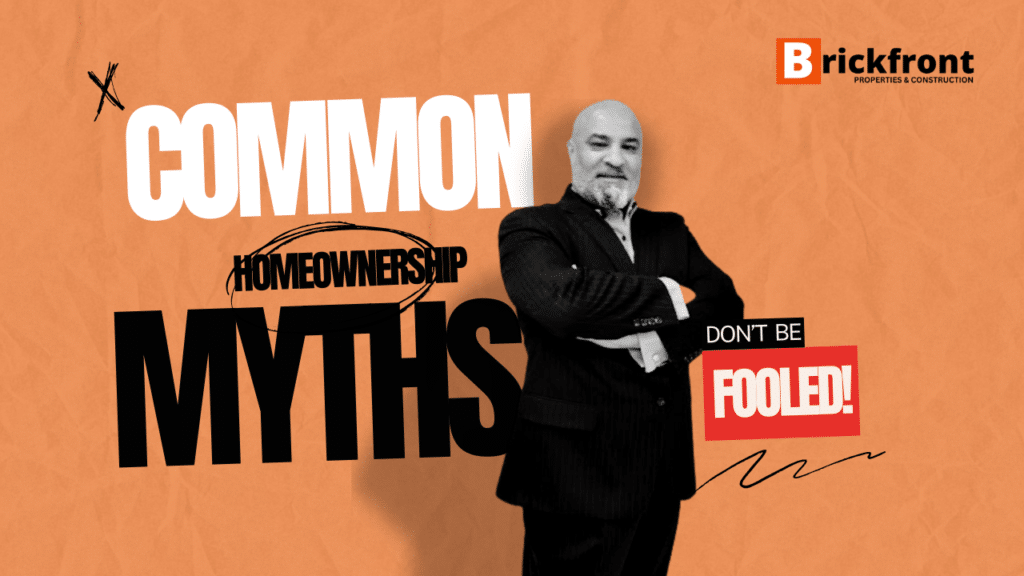
Key Takeaways: Debunking Myths About the 2024 Housing Market
- The market has shifted: Gone are the bidding wars, replaced by a more balanced environment.
- Prices aren’t crashing: A dramatic housing crash is unlikely due to low inventory and a strong underlying economy.
- Waiting isn’t a guaranteed win: Renting has costs too, and interest rates might rise, affecting affordability.
- Low down payment options exist: FHA, VA, and USDA loans offer paths to homeownership with lower down payments.
- Good deals can be found: Be flexible, consider fixer-uppers, and work with a realtor to find hidden gems.
- Rising rates don’t mean you’re out: Shop for the best rates, consider long-term gains, and focus on overall affordability.
- Negotiation is key: Sellers are more open to offers. Come prepared with data, highlight your qualifications, and negotiate closing costs.
- First-time buyers can succeed: Educate yourself, find a specialized realtor, and get pre-approved.
- Cash offers aren’t everything: Strong financing and a fast closing can compete effectively.
- Bidding wars are less common: Set a budget and highlight your offer’s strengths.
- The “right” time to buy is personal: Consider your life stage, financial stability, and current interest rates.
- Knowledge is power: Do your research, connect with a realtor, and get pre-approved for a smooth home-buying journey.
The 2024 housing market is a far cry from the breakneck pace of recent years. Gone are the bidding wars and instant offers. In their place, a more balanced market has emerged, leaving some buyers and sellers confused. This shift has also created a breeding ground for myths and misconceptions. Separating fact from fiction is crucial for anyone navigating this dynamic landscape.

In this blog compiled by Brickfront and Local Washington DC Construction, we’ll tackle some of the most common myths swirling around the 2024 housing market, helping you make informed decisions:
Myth #1: Home Prices are Crashing
Headlines love drama, and “housing crash” is a surefire attention grabber. However, the reality is far less sensational. While the rapid price appreciation of the past few years has slowed, a true crash (a significant and sustained decline) is highly unlikely.
Here’s why:
- Inventory Shortage: The number of homes available for sale remains low in many areas. This limits the downward pressure on prices.
- Strong Underlying Economy: While some economic headwinds may exist, the overall outlook is positive. This translates to continued buyer demand.
- Historical Context: Dramatic price drops are rare in housing markets. Historically, corrections have been more moderate.
Myth #2: Waiting Guarantees a Better Deal
The idea that waiting for a significant price drop is a winning strategy can be a costly gamble. Here’s the thing:
- Market Could Stay Flat: Prices may stabilize instead of dropping significantly. In the meantime, you’ll miss out on potential homeownership benefits like building equity and securing a stable living situation.
- Interest Rates Could Rise: Mortgage rates are a key factor in affordability. While they may dip slightly, there’s also a chance they could increase, further impacting your buying power.
- Opportunity Cost: Renting comes with its own set of costs, and you won’t be building equity. By waiting, you could miss out on homeownership’s long-term financial benefits.
Myth #3: You Need a 20% Down Payment
The 20% down payment is a traditional benchmark, but it’s not an absolute requirement. Several loan options allow you to enter the market with a lower down payment:
- FHA Loans: Backed by the Federal Housing Administration, these loans require as little as 3.5% down.
- VA Loans: Veterans Affairs offers loans with no down payment for qualified veterans.
- USDA Loans: The U.S. Department of Agriculture offers loans for rural properties with no down payment required.
These options come with some stipulations, but they can significantly reduce the upfront financial barrier to buying a home.

Myth #4: There’s Nothing Good Left to Buy
Low inventory doesn’t mean there are no good deals to be found. Here’s the key:
- Broaden Your Search: Be flexible on location, size, or features. You might discover hidden gems that perfectly suit your needs.
- Consider Fixer-Uppers: If you’re handy or willing to invest in renovations, a fixer-upper could offer significant long-term value.
- Work with a Realtor: A good real estate agent can help you identify under-the-radar properties and negotiate a competitive offer.
Want to know if the market is shifting from sellers to buyers? Click here to find out.
Myth #5: Rising Rates Mean You Can’t Afford a Home
While higher interest rates do impact affordability, it doesn’t automatically disqualify you from buying. Here’s how to adjust:
- Shop Around for Rates: Compare rates from multiple lenders to ensure you’re getting the best deal. Even a small difference can significantly impact your monthly payment.
- Factor in Long-Term Gains: Homeownership offers long-term benefits like appreciation and potential rent increases. While the initial payment might be higher, these factors can offset the cost.
- Focus on Long-Term Affordability: Don’t just consider the upfront cost. Analyze your overall budget and ensure the monthly payment is comfortable over the long term.
Myth #6: Sellers Won’t Budge on Price
The days of sellers receiving multiple offers above the asking price are largely gone. Today’s market presents an opportunity for negotiation:
- Come Prepared with Data: Support your offer with comps (comparable properties) that demonstrate the home’s true value.
- Highlight Your Qualifications: A strong pre-approval letter shows you’re a serious buyer and reduces the seller’s risk.
- Consider Closing Cost Credits: Negotiate for the seller to cover some closing costs, which can make a significant difference in your upfront expenses.
Myth #7: The Market is Too Complicated for First-Time Buyers

Entering the housing market for the first time can be daunting, but it’s not insurmountable. Here are some tips to navigate the process:
- Educate Yourself: Research the market, loan options, and the home-buying process. Knowledge is power, and the more you understand, the more confident you’ll feel.
- Find a Realtor Who Specializes in First-Time Buyers: An experienced agent can guide you through the process, explain paperwork, and advocate for your needs.
- Get Pre-Approved: A pre-approval letter shows sellers you’re a serious buyer and streamlines the offer process.
Myth #8: All-Cash Offers Always Win
While cash offers can be attractive to sellers, they aren’t the only path to success. Here’s why:
- Strong Financing can Compete: A well-qualified buyer with a strong pre-approval can be just as appealing as a cash offer.
- Sellers Consider Closing Speed: If your financing is secure, you might be able to close faster than a cash buyer with complex logistics.
- Negotiate Inspection Repairs: Cash buyers often waive inspections, but a financed buyer can negotiate repairs, potentially saving money in the long run.
Myth #9: Bidding Wars are the Norm
The bidding frenzy of the past has subsided. Today’s market allows for more measured negotiation:
- Set a Budget and Stick to It: Don’t get caught up in emotional bidding wars. Determine your maximum comfortable price beforehand.
- Highlight Your Offer’s Strengths: If you’re willing to close quickly or waive certain contingencies, showcase these advantages to the seller.
Myth #10: There’s a “Right” Time to Buy
The “right” time to buy a home is highly personal. Here are some factors to consider:
- Life Stage: Do you plan to stay in the home for a long time? If so, market fluctuations may be less concerning.
- Financial Stability: Are you in a secure financial position with a steady income and emergency savings?
- Interest Rates: While rates may fluctuate, waiting for a specific rate might not be the best strategy if you find the right home.

The Bottom Line: Knowledge is Power
The 2024 housing market offers opportunities for both buyers and sellers. By understanding the common myths and remaining informed, you’ll be well-equipped to make sound decisions and navigate the market with confidence. Remember, consulting with a qualified real estate agent can be an invaluable resource throughout the process.
Taking Action
- Research: Explore local market trends and get a feel for available properties.
- Connect with a Realtor: Find an agent who understands your needs and can guide you through the process.
- Get Pre-Approved: Secure a pre-approval letter to solidify your buying power.
By taking these steps, you’ll be well on your way to achieving your homeownership goals in the 2024 market.

